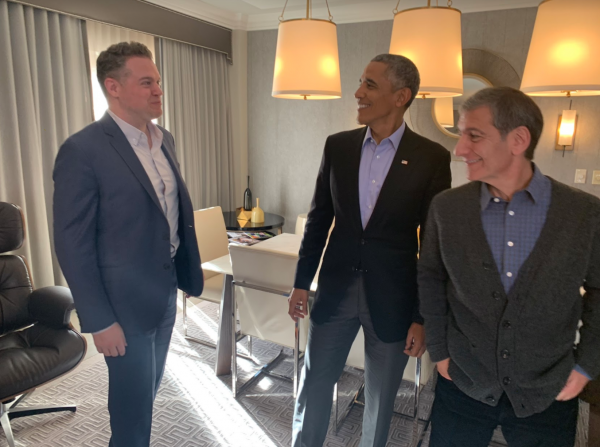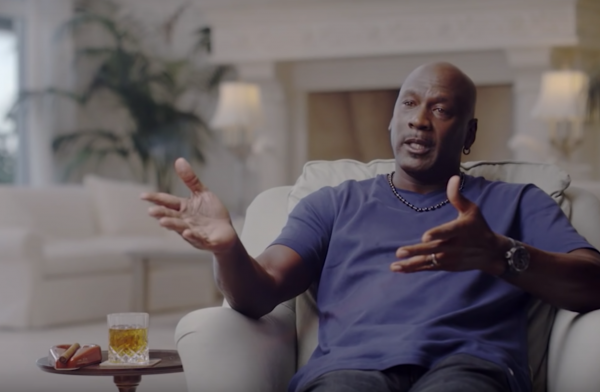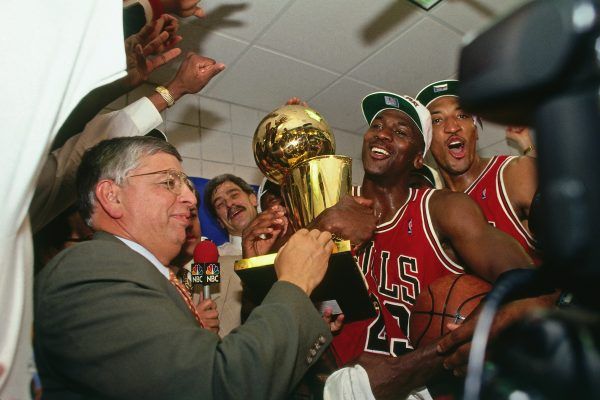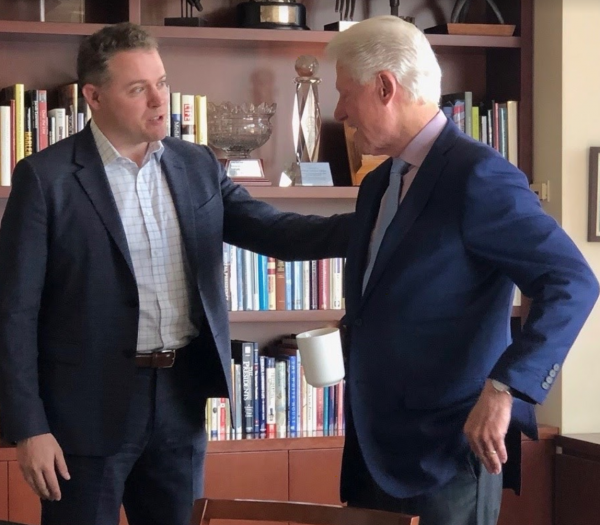Is it any surprise that when America needed a hero to cure the pandemic blues on Sunday nights this past spring, the country turned to one of its greatest sportsmen -- and businessmen -- Michael Jordan. Millions tuned in to watch The Last Dance, ESPN's 10-part Chicago Bulls documentary from director Jason Hehir, which has remained in the public consciousness months later thanks to its second window on Netflix, where millions more are discovering the joys of Jordan and his colorful teammates. '
Hehir came at the series from the perspective of a Boston Celtics fan, having grown up in Newton, Massachusetts. He was in the stands at the Boston Garden when Jordan torched the Celtics for 63 points in the '86 playoffs, and little did he know way back then that nearly 35 years later, he'd grow up to direct the definitive documentary about Jordan and the Bulls dynasty.
Jordan is considered one of the greatest competitors in all of sports, and while art isn't a competition, The Last Dance is up for an Emmy this year, and it would make a worthy winner. I had a blast with both Tiger King and McMillions, but The Last Dance is the kind of accomplishment that will leave you in awe of both its subject and its assembly. Not only is the docuseries is very well-structured, but it takes you inside Michael's mind and gives the viewer a taste of what it must've been like to walk in his Air Jordans back in the Bulls' heyday, when they won six titles in eight seasons. People will be watching The Last Dance 20 years from now, and I'm not sure I can say the same for the adventures of Joe Exotic.
Not only will I tip my cap to Hehir for delivering the most entertaining TV series of 2020, but in all seriousness, I asked him some tricky questions, and he offered thoughtful answers to each one. After talking to him, it was easy to imagine how he landed this incredible gig -- the opportunity of a lifetime, really, for a lifelong basketball fan. Hehir also told Collider who was the toughest interview to land, and the person he wishes he could've convinced to appear on camera, as well as which sports dynasty deserves the docuseries treatment next. Enjoy our chat below, and come back to Collider on Sept. 20 to see if The Last Dance wins the Emmy for Outstanding Documentary or Nonfiction Series.
What's your earliest memory of Michael Jordan as a kid?
JASON HEHIR: There were two. One was being at the Nike story in Belmont and fighting over who got what poster of his with my brothers, because we were all [fans]. I don't know how I first heard of him, but I know that by the time I walked into that store, that symbol, the original Air Jordan symbol with the wings, that just equaled cool, and Michael equaled cool for an eight-year-old kid. So, fighting over those posters with my brothers over who got to hang what in their room, and then I was lucky enough on April 20, 1986 that my Dad took me to see Michael play for the first time as a belated Christmas gift, and that happened to be the day that Michael scored 63 points, so I was in the building. The first time I ever laid eyes on him in person was when he scored 63.
How do you end up being the guy to be asked to direct this series?
HEHIR: Well, with the footage, a lot of those pieces had been put into place before I came into the picture, because the condition under which the footage was shot in 97-98 was that Michael had to approve the release of it, and the NBA had to approve the release of it, before it could be made it anything. And back then, 10-part documentary series just about anything didn't exist, but especially about the NBA. You could barely find a sports documentary back in those days, it was not nearly as prolific as they are now.
So in 2016, Mike Tollin, who runs Mandalay Sports Media, which is the production company on this, he had a meeting with Michael and his advisors and convinced them that this was the time to tell the story, and once Michael said 'okay,' the NBA quickly followed suit. And then they started looking for directors, and it was about 4 years ago to the day that I was contacted to see if I'd be interested, and of course, the answer was an emphatic 'YES' in capital letters.
With Jordan and the NBA being involved as producers, was there anything they pressured you to cut that was considered too risqué for broadcast?
HEHIR: No, there was never any... because I wouldn't have agreed to do the project if such conditions were enforced, so from the outset, we all agreed that this should be comprehensive, and in order for it to be respected as a responsible, comprehensive documentary, we have to go places that may be uncomfortable for Michael, or that don't cast him in a flattering light. If they wanted to make a 10-part docuseries about how great Michael Jordan is, you can go on YouTube and watch highlights all day if you want to see that.
But I really was more interested in discovering more about Michael Jordan the man, and also going into the backstories of the people who were the key cogs in the machine that was that Bulls dynasty in the '90s. Because the documentary is about the Bulls dynasty as seen through the lens of the 97-98 season, and of course it's going to star Michael Jordan, but it's also about a lot more than Michael's life in basketball.
So you never felt it was a Michael Jordan documentary, you always felt it was a Chicago Bulls documentary?
HEHIR: Yes, and I think that, proportionate to how important Michael was to those Bulls teams, is proportionate to how important he was to this doc, but it's a doc about the dynasty. To me, on a larger scale, the doc is about the pursuit of greatness and the price of greatness.
Do you consider The Last Dance to be a movie or a TV seres?
HEHIR: It's a TV series. Also, at this point, I don't think that that's a pejorative anymore. I think that there are TV series that are just as respected if not more than some of the greatest feature films that we've seen. We approached this as a 10-chapter television series, and embraced the fact that there were going to be breaks in between episodes, and having to lead to a cliffhanger for an episode. We never had any illusions about this being a 500-minute movie.
In that same spirit, and this is just for comparison, do you consider O.J.: Made in America to be a movie or a TV show?
HEHIR: I think O.J. was crafted to be a movie. I know that Ezra [Edelman] was emphatic about the fact that it was a film. Now, where ESPN chose to cut it, I'm sure they had discussions about it, and I can't speak for him, but in knowing how hard he worked on it, I know he was emphatic it was a film. I think what we made were 10 individual films that were broadcast as episodes on television.
Do you consider The Last Dance to be a work of journalism?
HEHIR: No, and again, I'm not a journalist. I am a storyteller, and we strive to be factually accurate, and we strive to be comprehensive, and we strive to tell as many sides of the story that we can, but we're also telling this story through the lens of the main characters. So when the Ken Burns criticism came out -- and Ken and I actually spoke about this -- there are different specifications that PBS has for what a documentary entails for them. If anyone has any connection to the material whatsoever, then they are eliminated from being a part of it, and we, thankfully, didn't have that.
I strive to tell great stories, and I strive to give people a voice to tell the story that they want to tell. That doesn't mean that we're doing any kind of a puff piece, it means that we're letting people tell the story as they remember it, and I try to tell it from as many sides as possible to get as comprehensive a look as possible.
How helpful has the show's second window on Netflix been to its overall popularity and accessibility?
HEHIR: Tremendously. Netflix is synonymous, almost, with TV now. It has just become a catch-all for any material that people are going to watch, even if it's not that particular platform. There are a lot of younger people who are part of the cord-cutting generation and probably don't even know where ESPN is on their cable dial, but they certainly know how to call up Netflix on their phone or their tablet or their that laptop, and that's how they consume media these days. I know specifically that friends of mine have children, teenagers, who didn't see it the first time around and are now experiencing the same enthusiasm that people experienced when they saw it in April and May. So I think Netflix has been a huge help in giving it a second wind.
Who was the toughest interview to land, and who was the interview you didn't get that you regret most?
HEHIR: This was not an easy booking process. We had 108 shoots, and we interviewed Michael three times, but there were 108 total interview shoots, and Jake Rogal, who was our lead producer, in addition to a lot of other hats, he wore the booking hat, so, to book 10 people is very difficult, and to book 106 people is miraculous, that he got that work done.
The guys on the Jazz... I think that for a lot of Michael's opponents, especially those who suffered losses deep in the playoffs and never got back to that mountaintop, I think it's very difficult for them to discuss these things, because it's still painful for them because they are just as competitive as Michael is, and they came out on the wrong side. So it took a while for us to convince Reggie Miller, but he eventually agreed to an interview in February of this year. He was one of our last ones.
It took a while for us to convince John Stockton, who is reticent and reluctant to do media to begin with. I didn't know what John Stockton's voice sounded like before we sat him down for an interview. It's true, I'd never heard a sound bite from him. But in January I finally got a dialogue going with him after reaching out to him for literally years, and he wanted to be assured that this wasn't going to be a Michael Jordan puff piece, and it was around the time that we were editing episodes 7 and 8, and I can promise you that we're going into some aspects of Michael's life that are not puff piece aspects, and we're telling the story not just of Michael, but of Dennis and Scottie and Phil Jackson and Toni Kukoc and Steve Kerr, and I told him it's very much a snapshot of '90s basketball, so your absence would be conspicuous, because you're one of the top five point guards ever, and you were a key player of that era.
So he eventually agreed, and he was our last interview. He was March 10. March 11 was the Rudy Gobert game that they canceled right before it tipped off. March 11, for me, and really everyone, is really like the JFK/where were you? moment, because that's when Tom Hanks tested positive. So the day before that, we were still shooting, to give you an idea of how last-minute this was. So yeah, opponents like Reggie and John Stockton were difficult to land.
And then for guys who I wish we had gotten, I wish we could've sat down and talked to Karl Malone, but he didn't want to be a part of it. He was the MVP in '97, and as Michael said, that drove him in those '97 Finals, and then he's the guy who Michael stole the ball from in the waning seconds of game 6, so he played a key role in some of the most memorable Finals appearances in NBA history, and it would've been great to get his perspective on playing against the Bulls.
Jordan really thought about how to motivate his teammates in order to maximize their performance and get what he needed out of them. Do you think he ever did the same thing to you as a director, and pushed you to make the best documentary possible?
HEHIR: I do. It wasn't Michael himself, because I had very little interaction with him over the process of making this doc, but those closest to him, yes. We had four partners on this documentary -- ESPN, Netflix, the NBA, and Jump 23, which is Michael's company. And a lot of people have said that Jordan Brand was a production company associated with this that had final cut. And none of those are true. Jump 23 is the company that controls the Jordan brand, and they are not a production company, and they did not have final say.
All of these partners that I just mentioned are multi-billion dollar entities who are used to getting their own way in any project, so it took an extraordinary amount of collaboration for all four of those partners to come to the table, with me and my team having a very specific vision of what we wanted this project to be, and for every episode to have the kind of notes that we had, people had different opinions -- not about what the story should be, but what it should look like, what it should sound like, what it should feel like, what the music should be, where the edit points should be. There were very specific cinematic discussions here, but what I will say with Michael's team, and specifically Curtis Polk and Estee Portnoy, there's an attitude at that company that you do not accept anything less than someone's absolute best. Even if something is very good.
I remember early on, when one of the first rough cuts came back for Episode 1, we were working our tails off to get everything done in time. An hour-long archival documentary from start to finish normally takes me a year, and we did 10 of these in two years. Curtis came back with his notes on Episode 1 and said "I love it. It's great. It's an A, but it can be an A+, and here's what I would do,' and that set off a week of discussions about minutiae in these docs. It was exhausting in the moment but I'm grateful for it now, because nothing was ever good enough until it was exactly what we all wanted it to be.
And there were some things where we had to lose the battle to win the war, and there were some things that i'm sure they wanted to be in that I held my ground on, but I do specifically remember that conversation with Curtis saying, 'it's an A but it could be an A+ and let's work to get there.' So it's not necessarily Michael, but it does come from top down, and luckily my staff is populated with people who accept nothing but the best out of themselves and I was around them too, so we were all like-minded, but it made for an exhausting process, that's for sure.
Speaking of structure, was the series always designed to be 10 episodes?
HEHIR: No, it was 10, and I can't tell you who made that decision. That's a business decision made by the powers that be at Netflix and ESPN. That's just the way that the contract was constructed. It was news to me, because I advocated for four episodes, and then they wanted to do eight.
And when you say four episodes, were you advocating for a four-hour film, or four two-hour episodes?
HEHIR: Four one-hour episodes. This is in the very beginning, because I had just seen The Defiant Ones on HBO, Allen Hughes' film about Dr. Dre and Jimmy Iovine, and I was so blown away by how great that was, that I said, if people are saying that we are comparable to that, then that's a victory, because you're not going to do better than that. So I said, 'we can tell this story in four hours, I think,' and then they said, 'well, we want to do eight, so can you do six?' And I said, 'alright, I can do six. I think we can stretch this out to six.'
And then, I was working on Andre the Giant at the time, and the next thing I knew, I was hearing a press release that said it was 10 hours, and I said 'oh, boy.' So we had our work cut out for us. But some of the early interviews we were doing were way into the minutiae of the evolution of the NBA under David Stern, and how Madison Avenue didn't embrace the '70s and early '80s NBA because it was seen as too black and drug-addled. So a lot of the interviews that we did hit the floor because I was so anxious at the outset of shooting about getting as much story as we could to fill up these 10 hours, but luckily there were such great characters on that team itself that we could've gone longer with these episodes and still kept it about the Bulls.
Who are some other athletes or teams that deserve this kind of treatment?
HEHIR: There's an '86 Mets doc that's in production that I can't wait to see, because that's a team that's another indelible team from my youth. I think that there's a lot to be mined from the '90s Cowboys teams with Troy Aikman and Michael Irvin and Emmitt Smith and Deion Sanders and Jimmy Johnson and Jerry Jones and Barry Switzer. There's a ton of characters on those teams. There's very few indelible to their era dynasties that are loaded with characters the way that this Bulls team was. There are some.
You could maybe look at Tom Brady's Patriots, but they were so consistent in the way that Belichick and Brady's personalities imbued that team. You had Deflategate and a few other controversial moments, but they didn't have the rollercoaster that these other teams had, and some of the backstories, we'll probably never know because they weren't allowed to speak as much as we're used to other teams speaking. But you have to start with the greatness first. There's plenty of teams that have plenty of great characters, but how many teams dominated for that long? There's not many.
So if you were asked to make a documentary about the Patriots, would you say 'yes,' or are you happy just being a fan?
HEHIR: I wouldn't immediately say 'no.' I would have to discuss the story they wanted to tell and the story that I wanted to tell, but I'm always going to pick up the phone for a 617 area code.
Do you think you need an attitude like Michael Jordan's to win six titles, or can you do it without rubbing people the wrong way?
HEHIR: I think there's many different managerial styles to maximize the performance of those around you. Michael's was more tough love, but you look at a guy like Tim Duncan, and he doesn't have that reputation, and yet his accolades are mind-blowing as well. I think that both in sports and entertainment and the business world, there are loads of stories about managers who go about it in different ways and still get to the top of the mountain, so I don't think it's necessary to do it Michael's way, but you can't argue with the results.
Who wins the NBA Finals this year?
HEHIR: Good question. Milwaukee.
Any idea what your next project will be?
HEHIR: There's a few I'm very excited about. I can't speak about them yet, but I took about a six-week hibernation after The Last Dance was done. At that point, I was so burnt out that I thought I was just going to go teach kindergarten in Alaska or something. I was ready to have that be my last project.
You've earned a vacation with this, Jason, but give me this much. Is it going to be about another athlete, or are you looking to explore other areas?
HEHIR: I'll always have my foot somewhere in the sports world, and have an iron in the sports fire, and hope to continue to get the opportunity to tell sports stories, but I'm really excited to branch out and do stories not just in the nonfiction world outside of sports, but in the scripted world as well.
The Last Dance is currently available on Netflix and ESPN+. To watch the trailer, click here.





